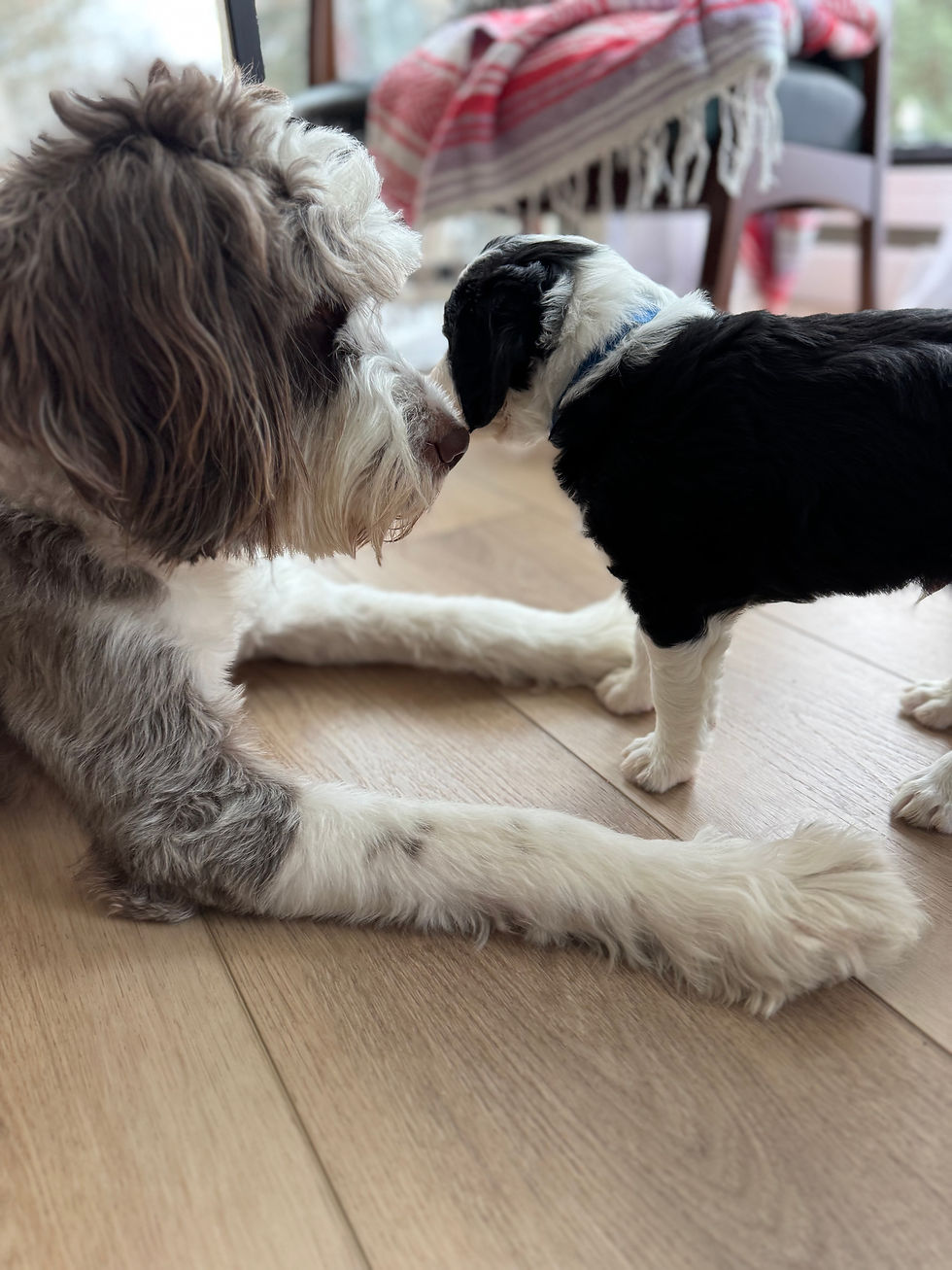Prepping Your Home for Puppy Mayhem
- woodbriaramds
- Apr 9, 2025
- 4 min read
Updated: Apr 18, 2025

🔗 Puppy Prep Checklist (With Recommended Products) Note: Some of the links below are affiliate links, which means if you click and make a purchase, we may earn a small commission—at no extra cost to you.
Before your puppy even sets one adorable little paw through the door, it’s time to prep your home like you’re expecting a tiny, fuzzy tornado. Because, well... you are.
1. Puppy-Proofing Like a Pro
Puppies are naturally curious, mischievous, and—let’s face it—a little reckless. If it dangles, they’ll tug it. If it rolls, they’ll chase it. If it smells like feet, it’s going in their mouth. So, let’s set them (and you) up for success:
Cords and cables: Tape them down, hide them, or get cord protectors. Chewing wires is a no-go.
Shoes and socks: These are apparently gourmet delicacies. Store them up high or behind closed doors.
Trash cans: Lock ‘em down or get ones with secure lids. Puppies love a good garbage buffet.
Toxic plants and foods: Check your space for common hazards like lilies, chocolate, or gum with xylitol.
Small objects: If it can fit in their mouth, it probably will.
2. Create a Safe Space
Puppies need a place where they can feel secure, rest, and decompress from their new, overwhelming world. Ideally, this includes:
A cozy crate (more on crate training later)
A soft bed or blanket
A puppy playpen
A couple of chew toys
Easy access to water
Sound machine or soft music
This area should be away from loud noises or heavy foot traffic, but still close enough that they can see and hear you.
3. Gear Checklist
Below is a checklist of must-haves, complete with links to trusted products we love and recommend. Click to explore or purchase:
🏠 Crate – MidWest Homes for Pets Dog Crate
𐂺 Puppy Playpen - Homeplus Indoor Dog Playpen
🍽️ Dog Bowls - GORILLA GRIP Set of 2 Dog Bowls
🐾 Puppy Food - Blue Buffalo Puppy Food
🎾 Chew Toys – KONG Puppy Toy
💩 Enzyme Cleaner – Rocco & Roxie Stain & Odor Eliminator
🧼 Puppy Shampoo – Burt’s Bees Puppy Shampoo
🛏️ Comfy Bed - Furhaven Orthopedic Dog Bed
🪒 Grooming Tools – Hertzko Self-Cleaning Slicker Brush
🍖 Training Treats - Pupford Freeze Dried Training Treats
🐕 Leash and Collar Set - Dog Collar and Leash Set
4. Family Game Plan
Everyone in the house should be on the same page. Decide in advance:
Where the puppy will sleep at night.
Where your puppy will be spending most of their days. This will typically be a crate inside of a playpen area near where the family spends most of their time. This safe space is where your puppy can freely go in and out of the crate, have some space to romp and play, have access to water and toys, and then be placed inside the crate during nap time.
How you're going to respond to negative behavior i.e. barking, biting, zoomies, potty accidents in the house, etc. We will discuss in the next couple of days what we suggest you do in these situations, but consistency is key between everyone in the household.
Who is going to be doing the majority of training? But again, everyone needs to be on the same page and know what/how the puppy is learning.
What are the rules? Is the puppy going to be allowed on the couch, be given table scraps?
5. Expect the Unexpected
Even with the best prep, your puppy will surprise you. That’s part of the joy—and the journey. Stay flexible, laugh at the mishaps, and keep a phone handy. You’re going to want to remember this. You will have so many opportunities to document the most adorable and most hilarious of moments! You should even think about getting a digital Puppy Milestone Journal to organize and document all these memories for future nostalgia.
We strongly suggest diving into some puppy training videos online—there’s a goldmine of helpful tips and step-by-step guidance on every command you’ll eventually want your pup to master. While your first week or two will focus on bonding and helping your puppy feel safe in their new world, it’s also the perfect time to sketch out a game plan. Knowing what you’d like to teach—and when—sets the stage for a smoother transition from wobbly pup to loyal pal faster than you’d think.
If you're following along with Woodbriar Wags, we proudly follow the Puppy Culture training protocol—starting as early as day 3 of a puppy’s life with ENS (early neurological stimulation). These short, daily exercises during the critical developmental window (days 3–16) have been scientifically shown to promote stronger neurological growth, improved stress responses, and better overall health.
From there, we move into the socialization period, covering weeks 2 through 12. This includes sound and scent desensitization, barrier challenges, crate and potty tray training, confidence building on uneven and novel surfaces, "sit to say please" work, and so much more. Our puppies get a solid head start on becoming calm, curious, and adaptable companions.
To keep the momentum going, each new family receives a copy of With Open Arms and a Level Head: How to Bring a Puppy Into Your Life—a continuation of the Puppy Culture philosophy that supports you as you carry on the training at home.
No worries - you got this!



Love all the great info! Thx so much for sharing it as well as your amazing pups❤️